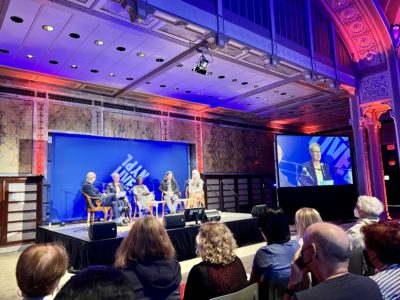
Those of us who aren’t historians might imagine that 19th-century efforts to impose morality on America have little to do with today’s political debate. Amy Werbel, acting chair and professor of History of Art, wants to correct that misconception.
“There’s this back-to-the-future quality of what’s going on now,” Werbel said, on the eve of Free Speech Week, which took place October 17–23.
A historian and expert on censorship, Werbel has written three books touching on that issue—two historical and one addressing contemporary China. She sees parallels between today’s book bans and academic restrictions and century-old efforts to mold the U.S. into a patriarchal, white Christian nation.
“Those of us who write about the history of censorship, or the history of the effort to suppress women’s access to health care and abortion—we’re getting a lot of work now and we’re not happy about it,” she added. “We’d be happy if it stayed in the dustbin.”
Fresh off a fellowship at the University of California’s National Center for Free Speech and Civic Engagement, Werbel has spoken on self-censorship in academic museums; participated in a New York Public Library/PEN America panel about current book bans; given a colloquium at the Center for Art Law and written an article for The Conversation linking a 19th-century effort to ban contraception and erotic imagery to the modern-day controversy over women’ right to abortion.
The 1873 Comstock Act—the first broad-based American anti-obscenity law, limiting limited birth control and written and visual works deemed indecent—was the subject of Werbel’s most recent book, Lust on Trial. When she spoke at the New York Public Library in September at a panel where she shared the stage with actor André DeShields and journalist Ali Velshi, Werbel explained how the law led to blanks appearing in classic texts published in the U.S., as well as arrests of feminist writers, and attempts to ban James Joyce’s Ulysses.
As inevitably happens with censorship, the Comstock Law created a backlash, helping make nudity “chic and modern” by the turn of the 20th century, at the same time as it made the U.S. the laughingstock of the Western world, Werbel explained.
“There’s a real downside to believing that we can purify American expression in ways that are only beneficial,” she says. “As we’re seeing now, when you empower state agents to regulate expression, those who are already powerful in society will have an outsize ability to suppress the speech of those whose opinions are already oppressed and marginalized in society.”
Of course, censorship often comes out of admirable impulses, such as the desire not to hurt others or not to focus on divisive issues. But, as Werbel’s scholarship shows, grappling with unpleasant realities is crucial if America is to fulfill its promise of a multiethnic democracy.
“We all grow up with having our speech shaped—don’t say that, that’s hurtful, that’s harmful, that’s going to make someone feel bad,” says Werbel. (She had her own experience with speech discipline at the age of 4, when she said her first curse word, and promptly had her mouth washed out with soap.)
“We should teach our children to not say things that are unkind, that are thoughtless. However, using speech effectively also means speaking truth to power, and speaking in a way that causes emotional distress,” she says.

Even scrubbing content widely understood as hateful can rob people of crucial information. For instance, efforts to remove images like the Confederate flag from online platforms would also suppress news photographs of protesters storming the U.S. Capitol on January 6, 2021.
“It’s not like if you ban the white supremacist manifesto or the book that discusses rape, that those things will go away. But what’s really scary is your kid could encounter a white supremacist manifesto on the internet and think it’s factual because they have no critical-thinking apparatus,” Werbel says.
“We need to support, in every place and in every way possible, forums for having these very difficult conversations, and we need to prepare our young people to have these very difficult conversations.”
She adds: “In a democracy, we rely on citizens to hold power. In order to perform that function, people need access to good information, competing viewpoints, in order to make the best decision for themselves and for their families. Any attempt by the state to shut that down is censorship.”
